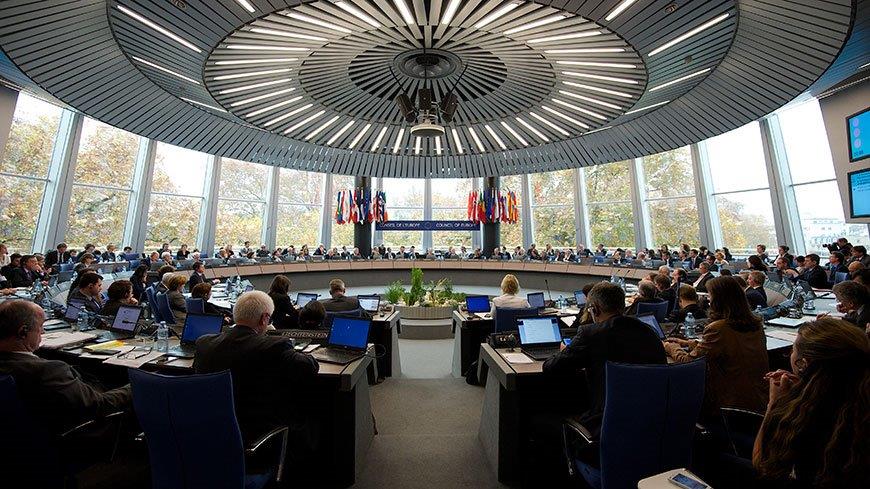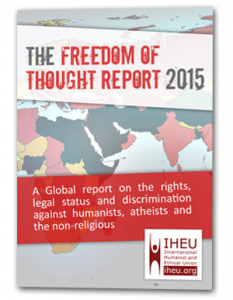A submission made on behalf of twenty-two international non-government organizations (INGOs) for a debate at the Council of Europe features the work of the International Humanist and Ethical Union (IHEU), citing the Freedom of Thought Report on discrimination and persecution against the non-religious, and emphasizes the vital role of education on the issues of citizenship and human rights.

Committee of Ministers meeting room at Strasbourg
The Conference of INGOs of the Council of Europe submitted the written contribution ahead of the a thematic debate last week (15 March) of the Committee of Ministers (made up of the Ministers for Foreign Affairs of member States). The subject of the debate was “Rising extremism, radicalisation and xenophobia in the fight against terrorism: Building inclusive societies as a cure / The need for collective action”.
The debate itself fell exactly one week prior to the Brussels bomb attacks yesterday (22 March) which have killed at least 31 victims plus the two attackers, and between two terror attacks in Turkey, a car bombing in Ankara (13 March) which was later claimed by Kurdistan Freedom Falcons (TAK) and killed 37 victims, and a suicide bombing in Istanbul (19 March) which was linked to ISIS and killed 4 victims plus the attacker; this was the fourth suicide bombing in Turkey in 2016 alone.
The INGOs submission notes that Europe “is in the depths of a political crisis, reflected in the growth of populist parties, the increasing number of terrorist attacks, the humanitarian crisis prompted by the influx of refugees and, at the same time, the ongoing economic crisis”. Many of the participating INGOs expressed concerns about “excessive controls” placed on civil society in a number of European countries, as well as criticizing prolonged “state of emergency” measures as an excessive response to terrorism.

The latest Freedom of Thought Report by the IHEU
Drawing on the IHEU report, the submission notes that:
The manipulation of religion is a constant risk. This can also be generated by populist movements which use the people’s religious beliefs in their political influence strategies. The freedom of thought of believers and non-believers and their right to express their beliefs is under threat in some countries of the world, as is shown by the report of the International Humanist and Ethical Union (IHEU) available here: http://freethoughtreport.com/download-the-report/. Even though it is still very badly regarded in religious spheres, the need to involve LGBT persons, particularly in churches, is stressed by some denominational NGOs.
The submission goes on to highlight the crucial role of education in fostering inclusive and peaceful societies.
In addition to school education tailored to culturally diverse societies, education for citizenship and human rights should be part of the school culture and should involve practical and participatory learning. That would encourage youth participation and protect young people against the various forms of radicalisation. […] Access to rights for all is the foundation for building inclusive societies, a process that begins at school. Every child must find his or her place in the school and feel welcome.
Without this foundation, any educational models and methods, no matter how sensitive to cultural and religious diversity, will be bound to fail. The INGOs encourage member states to plan for long-term investment in high-quality education and to ring-fence it from deficit-cutting measures.
IHEU responded to the Conference of INGOs request for input to the submission. The submission does not necessarily reflect the policy and opinions of IHEU on every issue. The full submission by the Conference of INGOs on “Rising extremism, radicalisation and xenophobia in the fight against terrorism” can be found via the Council of Europe website.